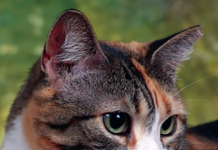An Outdoor ‘Catio’ Won’t Protect Him From the Heat and Parasites
Q. We have a 5-year-old cat we have built an outdoor enclosure for (he loves it!), but with summer upon us, we are concerned about the heat and other potentially dangerous health risks for cats. Can you give us a rundown of what we should be concerned about during the hot summer months?
A. First, I think its great that you have built an enclosure for your baby, as this addresses some of the major health risks to cats during the warm summer months. Cats are let out in an unsupervised fashion more during the warmer months (a practice that we do not endorse), exposing them to the risks of being hit by a car or getting into fights with other cats or animals. Such encounters increase the risk of traumatic injuries ranging from infections because of bite wounds to life-threatening or even fatal blunt-force injuries.
Fights with other cats also increase the risk of infection with viral diseases such as feline immunodeficiency virus, and altercations with wild animals increase the risk of rabies virus infection. Making sure that your kitty is vaccinated for infectious diseases will minimize these problems, and we recommend that all cat owners discuss this with their cat’s veterinarian.
Summertime is also party time for a number of parasites that may infest cats. Infestation with fleas, ticks, mites, a variety of intestinal worms, and other nasty little critters such as heartworms are more likely then. It is important to realize that although your outdoor enclosure may protect your kitty from traumatic encounters with cars and beasts, it may not protect against many of these parasites.
Infestation with parasites may cause problems ranging from discomfort due to itching and allergies secondary to parasites of the skin and ears (ectoparasites) to the gastrointestinal upset that may be caused by intestinal worms to potentially life-threatening heartworm infections (although this is a rare consequence of heartworm disease in cats). For these reasons, I recommend that you discuss prevention of parasitic infestation with your cat’s veterinarian, even if you are diligent, as you clearly are in building your baby a nice outdoor catio!
Finally, high temperatures increase the risk for dehydration and heat exhaustion and stroke. Hyperthermia (elevated body temperature) can cause a variety of potentially life-threatening problems in cats, including abnormalities of blood clotting, respiration and neurologic function. The signs of heat exhaustion include lethargy, vomiting, stumbling/staggering gait, rapid/heavy breathing, and redness of the tongue/mouth. If any of these signs are noted in a cat during hot weather, it is vital that owners seek immediate veterinary care and make attempts to cool the cat down with cool water and/or ice packs.
Hyperthermia can be avoided by always providing shaded areas and plenty of cool, fresh water for cats who are outside. And, or course, never leave a pet (any pet!) unattended in a car. In the hot summer months, temperatures can soar to life-threatening levels very quickly.
Another risk to cats, particularly white cats, in the summer is sunburn. Discuss the possibility of using a veterinary-specific sun block for your kitty with the veterinarian, and do not use human sun block for this purpose without prior consultation.
It is important to point out that the best way to avoid virtually all of these problems is to keep your cat indoors year round. This will not only benefit your kitty’s health, but it will also minimize the effect of outdoor, unsupervised cats on native and indigenous wild species of small mammals, reptiles and birds. Recent evidence suggests that unsupervised outdoor cats take a tremendous toll on a variety of wild species, and it is incumbent upon the cat-loving public to take measures to minimize this effect to whatever extent possible.
I hope that this is helpful and that you and your kitty have a great, safe summer. —Best regards, Elizabeth ❖



